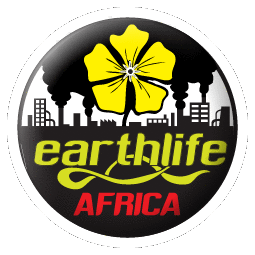Earthlife Africa
Lua error in package.lua at line 80: module 'strict' not found.
Earthlife Africa is a South African environmental and anti-nuclear organization founded in August 1988, in Johannesburg. Initially conceived of as a South African version of Greenpeace, the group began by playing a radical, anti-apartheid, activist role. ELA is arguably now more of a reformist lobby or pressure group. Considered by some to be a key voice in the emerging environmental justice movement, Earthlife Africa has been criticised for being too radical, and by others for "working with traditional conservation movements" in furthering the environmental struggle.
The Earthlife Africa constitution (and name) was formally adopted at the first national conference at Dal Josophat, near Paarl (outside of Cape Town) during 1989. Earthlife Africa was chosen as a conscious attempt to avoid the split affecting two factions in GreenPeace who were vying for control of the organisation. ELA therefore took a different approach to the environmental struggle.
The ELA constitution was initially loosely based upon the Four Pillars of the Green Party and other movement documents. In attendance at this historical inauguration of South Africa's green movement were various members of related environmental organisations and ecology groups including:
- Peter Lukey
- Chris Albertyn
- Mike Kantey
- Elfrieda Strauss
- David Robert Lewis
- Rachel Brown
According to Jacklyn Cock, "the concept of environmental justice was first introduced in South Africa at the Earthlife 1992 conference." Environmental Justice "was articulated as a black concept and a poor concept and it took root very well’ [1] More accurately, it was the Environmental Justice Network Forum (EJNF) which was initiated at the 1992 conference hosted by Earthlife Africa on the theme "What does it mean to be green in South Africa.’ At this conference 325 civil society delegates resolved to redefine the environmental agenda in South Africa in broad terms and to move beyond the loose anarchist constitution which had bound members with 'values' as opposed to 'rights'. The South African National Conference on Environment and Development had already set the agenda of the green movement in 1991 and thus the 1992 ELA conference was merely a sequel and precursor of later development within the broader movement.
The exposure of pollution by Thor Chemicals, a corporation which imported toxic waste into South Africa, by Earthlife and EJNF working closely with the Legal Resources Centre, the Chemical Workers Industrial Union, affected workers and local communities was the crucial turning point in the re-framing and ‘browning’ of environmentalism in South Africa.[2]
Earthlife launched the People’s Environmental Centre, the Greenhouse in 2002.
2007 ELA participates in a parliamentary portfolio committee hearing into the nuclear industry, delivering submissions and hearing from widows and workers affected by the Pelindaba accident [3]
September 2010, Public Enterprises Minister Barbara Hogan announces the ANC government decision to mothball the PBMR project. The cost to the taxpayer is in the region of between R7bn and R9.5Bn wasted on an unproven technology which could not produce a working reactor after more than 11 years of research.[4]
Contents
Conveners
- Maya Aberman (Cape Town branch) 2006
- Nosiphiwo Msithweni (Cape Town branch) 2007
Campaigns
- Apartheid is an Ecology issue
- Nuclear Energy Costs the Earth Campaign (NECTEC)
- Toxics Campaign focuses mainly on the prevention of proposed incinerators, through input into EIAs
- Sustainable Energy and Climate Change Partnership (SECCP)
Demonstrations
- 1998: picket at Durban harbour against a nuclear waste ship
- 2008: picket against the arrival of the USS Theodore Roosevelt [5]
Publicity
- 1998: campaign against air pollution in Johannesburg, three prominent sculptures were decorated with gas masks. They disseminate information on issues such as climate change, genetic engineering and nuclear energy
Conferences
- 1991 South African National Conference on Environment and Development
- 1992 What does it mean to be green in South Africa.
Legal cases
- 15 September 2003 Earthlife Africa - Cape Town launched a High Court application in Cape Town, seeking to review and set aside the environmental impact assessment (EIA) authorization granted to Eskom to build a demonstration module Pebble Bed Modular Reactor (PBMR) at Koeberg, Cape Town.[6]
- 2005 Earthlife Africa (Cape Town Branch) v Eskom Holdings Ltd, Access to Information [7]
- Earthlife Africa (Cape Town) v Director General Department of Environmental Affairs and Tourism and Another (7653/03) [2005] ZAWCHC 7; 2005 (3) SA 156 (C) [2006] 2 All SA 44 (C) (26 January 2005) [8] The director-general: department of environmental affairs & tourism decision, made on 25 June 2003 in terms of s 22(3) of the Environment Conservation Act 73 of 1989, authorising the Eskom Holding’s construction of a pebble bed modular reactor at Koeberg, was reviewed and set aside. The matter was remitted to the director-general with directions to afford the applicant and other interested parties an opportunity of addressing further written submissions to him along the lines as set out in this judgment and within such period as he may determine and to consider such submissions before making a decision anew on Eskom's application. Both the director-general and Eskom were ordered jointly and severally to pay the applicant’s costs, including the costs of two counsel.
See also
- Conservation movement
- Ecology
- Ecology movement
- Environmentalism
- Environmental movement
- Environmental protection
- List of environmental organizations
- Natural resource
- Renewable resource
- Sustainable development
- Sustainability
References
- ↑ Interview, Munnik, 2004, quoted in Jacklyn Cock, Connecting the red, brown and green: The environmental justice movement in South Africa
- ↑ Bennet quoted in Cock ibid
- ↑ Lua error in package.lua at line 80: module 'strict' not found.
- ↑ Lua error in package.lua at line 80: module 'strict' not found.
- ↑ Lua error in package.lua at line 80: module 'strict' not found.
- ↑ Lua error in package.lua at line 80: module 'strict' not found.
- ↑ [1] Archived August 28, 2008 at the Wayback Machine
- ↑ Lua error in package.lua at line 80: module 'strict' not found.
